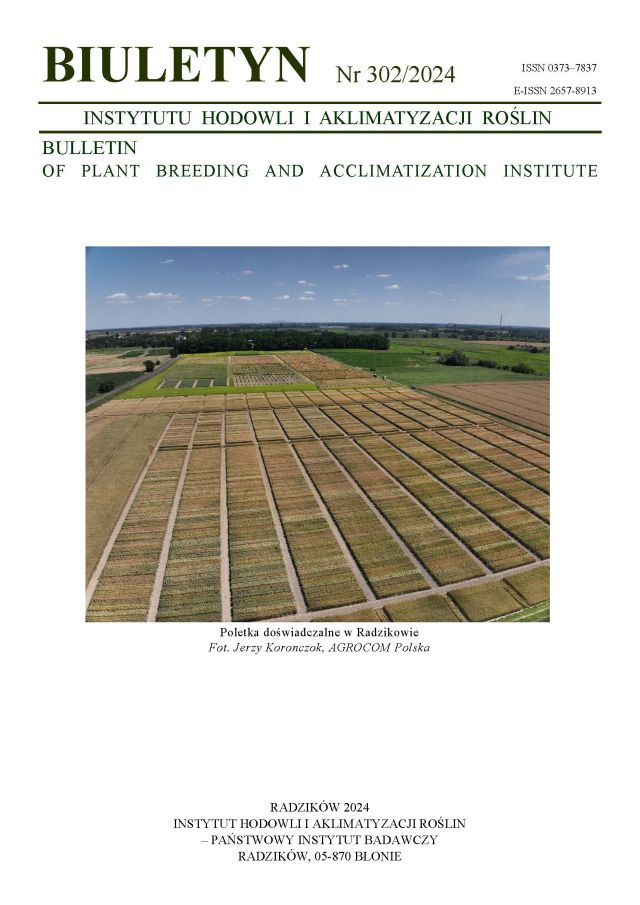Correlations between yield related characters of some forms of spring barley (Hordeum vulgare L.)
Marzena Lisowska
iro@uph.edu.plKatedra Hodowli Roślin i Nasiennictwa, Akademia Podlaska, Siedlce (Poland)
Abstract
Three forms of spring barley (Hordeum vulgare L.): the six-rowed mutant of two-rowed Damazy variety, which was obtained after irradiating dry seeds by thermal neutrons, the six-rowed Klimek variety and the two-rowed Rataj variety were used as an experimental material. The equations of multiple regressions for grain yield per plant were calculated. The path analyses of the revealed correlations were carried out using Wright’s method. In order to state more precisely the effect of different features on the main character, the features were grouped as vegetative and generative ones, taking into account the order of their appearance during the ontogenesis. Of the vegetative characters, productive tillering most affected the grain yield variation. In the mutant, the character was also determined by total tillering and in the Rataj variety by thickness of the second internode and straw weight. Of the generative characters, number of grains per plant and thousand grain weight remarkably influenced grain yield in all tested biotypes.
Keywords:
correlation, generative traits, grain yield per plant, vegetative traits, spring barley, regression, path analysisReferences
Biliński Z., Kudła M., Gacek E. 1997. Przydatność wybranych genotypów do hodowli odmian jęczmienia, odpornych na plamistość siatkową (Pyrenophora teres Drechsl.). Biul. IHAR 201: 237 — 245.
Google Scholar
Bombik A., Stankiewicz C., Starczewski J. 2000. Współzależność między niektórymi cechami ilościowymi warunkującymi plon wybranych odmian pszenżyta. Biul. IHAR 216: 131 — 136.
Google Scholar
Czembor H. J., Kudła M. M., Kudła M. 1985. Przydatność mutantów krótkosłomych w hodowli jęczmienia. Hod. Rośl. Aklim. 29, 1: 39 — 45.
Google Scholar
Idźkowska M., Gołaszewski J. 1993. Analiza współczynników ścieżek w ocenie materiałów hodowlanych. Biuletyn Informacjny ATR w Olsztynie 23: 159 — 164.
Google Scholar
Kudła M. M., Kudła M. 1995. Genetyczne możliwości wzrostu plonowania jęczmienia jarego. Biul. IHAR 193: 35 — 43.
Google Scholar
Kudła M., Biliński Z. R., Kudła M. M. 1998. Ocena wybranych genotypów z kolekcji odmian jęczmienia jarego. Biul. IHAR 207: 15 — 23.
Google Scholar
Ługowska B., Banaszak Z., Wójcik W., Grzmil W. 2004. Zależność plonu ziarna pszenicy ozimej o skróconym źdźble od jego składowych. Biul. IHAR 231: 5 — 10.
Google Scholar
Małecka I. 2003. Studia nad plonowaniem pszenicy ozimej w zależności od warunków pogodowych i niektórych czynników agrotechnicznych. Wyd. AR Poznań. Z. 335.
Google Scholar
Noworolnik K. 1990. Plonowanie odmian jęczmienia jarego na różnych dawkach azotu. Biul. IHAR 176: 37 — 41.
Google Scholar
Rachoń L. 2001. Studia nad plonowaniem i jakością pszenicy twardej (Triticum durum Desf.). Wyd. AR Lublin. Z. 248.
Google Scholar
Rybiński W., Adamska E. 2004. Analiza zmienności genetycznej cech ilościowych u mutantów nagoziarnistych jęczmienia jarego (Hordeum vulgare L.). Biul. IHAR 231: 297 — 305.
Google Scholar
Szempliński W., 2003. Siedliskowe i agrotechniczne uwarunkowania produkcji ziarna jęczmienia jarego na pasze w północno-wschodniej Polsce. Wyd. UWM. Olsztyn. Z. 71.
Google Scholar
Trętowski J., Wójcik A. L. 1991. Metodyka doświadczeń rolniczych. WSRP, Siedlce.
Google Scholar
Węgrzyn S., Bichoński A. 2000. Współzależności pomiędzy wybranymi cechami jakościowymi jęczmienia. Biul. IHAR 216: 165 — 171.
Google Scholar
Węgrzyn S., Wojas T., Śmiałowski T. 2002. Uwarunkowania genetyczne oraz współzależności plonu i wybranych cech użytkowych pszenicy ozimej (Triticum aestivum L.). Biul. IHAR 223/224: 77 — 85.
Google Scholar
Woźniak A., 2001. Studia nad plonowaniem, zachwaszczeniem i zdrowotnością pszenżyta jarego, pszenicy jarej oraz jęczmienia jarego w płodozmianach i krótkotrwałej monokulturze na glebie rędzinowej środkowowschodniej Lubelszczyzny. Wyd. AR Lublin. Z. 247.
Google Scholar
Wyszyński Z., Fiedorowicz A. 2005. Zmienność plonowania żyta ozimego na plantacjach produkcyjnych. Fragm. Agron. Puławy 1 (85): 701 — 710.
Google Scholar
Authors
Marzena Lisowskairo@uph.edu.pl
Katedra Hodowli Roślin i Nasiennictwa, Akademia Podlaska, Siedlce Poland
Statistics
Abstract views: 46PDF downloads: 21
License
Copyright (c) 2006 Marzena Lisowska

This work is licensed under a Creative Commons Attribution-ShareAlike 4.0 International License.
Upon submitting the article, the Authors grant the Publisher a non-exclusive and free license to use the article for an indefinite period of time throughout the world in the following fields of use:
- Production and reproduction of copies of the article using a specific technique, including printing and digital technology.
- Placing on the market, lending or renting the original or copies of the article.
- Public performance, exhibition, display, reproduction, broadcasting and re-broadcasting, as well as making the article publicly available in such a way that everyone can access it at a place and time of their choice.
- Including the article in a collective work.
- Uploading an article in electronic form to electronic platforms or otherwise introducing an article in electronic form to the Internet or other network.
- Dissemination of the article in electronic form on the Internet or other network, in collective work as well as independently.
- Making the article available in an electronic version in such a way that everyone can access it at a place and time of their choice, in particular via the Internet.
Authors by sending a request for publication:
- They consent to the publication of the article in the journal,
- They agree to give the publication a DOI (Digital Object Identifier),
- They undertake to comply with the publishing house's code of ethics in accordance with the guidelines of the Committee on Publication Ethics (COPE), (http://ihar.edu.pl/biblioteka_i_wydawnictwa.php),
- They consent to the articles being made available in electronic form under the CC BY-SA 4.0 license, in open access,
- They agree to send article metadata to commercial and non-commercial journal indexing databases.
Most read articles by the same author(s)
- Małgorzata Wyrzykowska, Jolanta Ziemiańska, Marzena Lisowska, Variability and correlations of some traits in lucerne (Medicago sativa ssp. L.) forms with different length of inflorescence , Bulletin of Plant Breeding and Acclimatization Institute: No. 246 (2007): Regular issue














